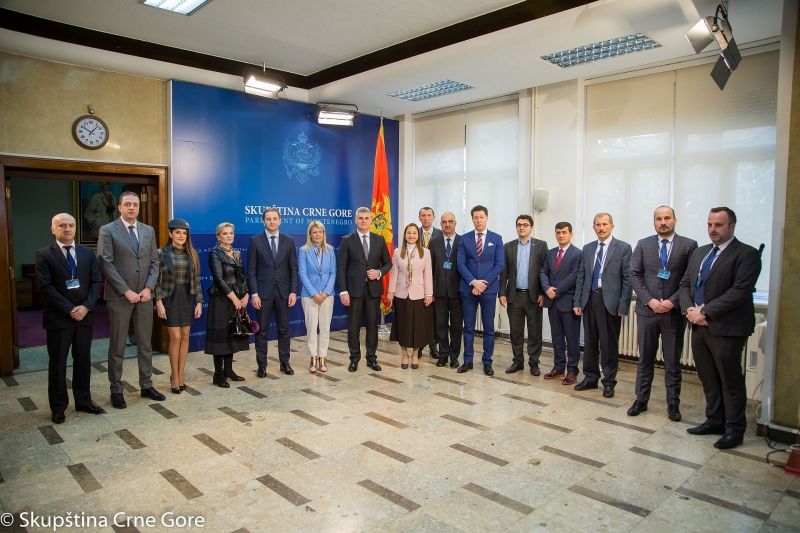Members of the Committee on Education, Science, Culture and Sports, Ms Branka Tanasijević, Ms Aleksandra Vuković and Mr Bogdan Fatić, attended the Meeting of the SEECP PA General Committee on Social Development, Education, Research and Science, chaired by Mr Radule Novović, member of the Parliament of Montenegro, and Chairperson of the Committee on Education, Science, Culture and Sports.
The Meeting, dedicated to the topic of "Science and New Technologies at the Service of Modern Education", which was held on 23 February 2019 in the Great Hall of the Parliament of Montenegro, was opened by the President of the Parliament of Montenegro, Mr Ivan Brajović, while the introductory speeches were delivered to the participants by Mr Damir Šehović, Minister of Education, Ms Sanja Damjanović, Minister of Science, and Ms Mimika Dobroshi, the expert of the Regional Cooperation Council (RCC).
The meeting was also attended by members of the General Committee from the parliaments of the countries of the region of South-East Europe: Serbia, Slovenia, Croatia, Bosnia and Herzegovina, North Macedonia, Kosovo, Romania, Bulgaria and Turkey. Also, upon the invitation of Mr Radule Novović, the Chairperson of the General Committee, the meeting was attended by representatives of educational institutions covering different levels of education system, significant institutions in the field of education, international institutions and telecommunication companies that contributed with their presence to analysing this important and current topic in an adequate way.
Chairperson Novović pointed out in his address that science and technology are the areas built into the foundation of modern society, the areas on which the prosperity of the human community rests. Furthermore, when it comes to the education system in particular, pupils and students need to acquire knowledge and skills for the digital age, in order to be ready to live, learn, work and serve to the society in a digital environment. The aim is for young people to reach a new defined level of literacy - 21st century literacy – which includes academic skills, thinking, understanding, teamwork and use of technology. In order to progress in the digital economy, pupils and students have to have knowledge of the digital age.
Finally, he concluded that South-East European countries have recognised the importance of the development of information and communication technologies and their application in education and that they have been very active at the regional level in the following ways: through investing in ICT infrastructure within education institutions and creating classrooms equipped by computers and internet connections, and through improving education system by making direct changes in schools’ curriculum, by overcoming the gap between different generations, strengthening researches in the region, by supporting ICT researches and process of technologies transfer, and through development of academic and scientific and research network and better connectivity between researches and institutions.
In their presentations, members of the General Committee from the parliaments of the countries of the region of South-East Europe, presented the situation, current events and good practice in their countries with reference to the mentioned area and pointed to the challenges they have been facing when it comes to the development and application of information and communication technologies in education.












